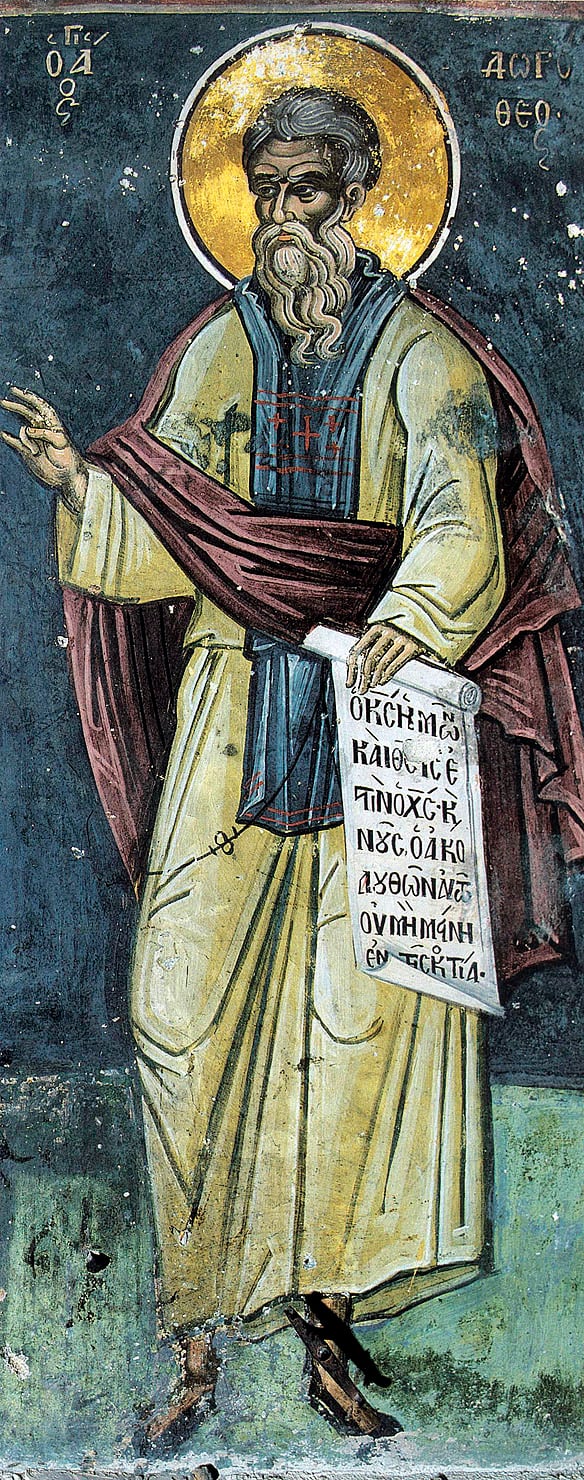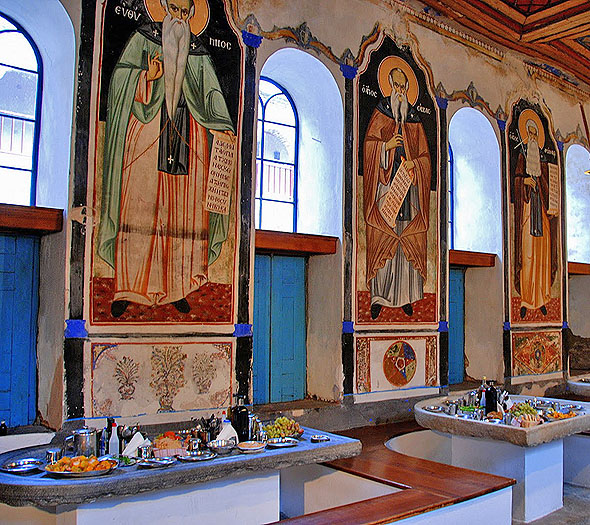Cut off the passions before the soul becomes accustomed to them – 2 (Saint Abba Dorotheos)
15 Ιανουαρίου 2017
 When I was in the coenobium, the Abbot, with the consent of the Elders, made me guest-master. I was, at the time, recovering from a serious illness. Strangers came and I stayed up with them; camel-drivers arrived and I looked after them. And there were lots of times when I was just about to go to sleep after all this when something would crop up and they’d rouse me again. Then it would be time for the vigil and, before I’d had time to get to sleep, the canonarch would come to wake me. Then, whether it was from tiredness or illness- because I still had a slight fever- I’d feel so completely exhausted that I had trouble knowing where I was. So I’d be half-asleep when I replied ‘Very well, Elder, may God remember your love and reward you. You’ve called me and I’m coming’. But as soon as he’d gone, I’d drop off again. I was really sad when I was late for the vigil, and since the canonarch couldn’t wait for me to get up, I asked two other brothers, one to wake me and the other not to let me fall asleep again when it was time for the service. Believe me, brethren, I really considered them agents of my salvation and I held them in great respect. You should feel the same towards those who wake you to get to church or to do anything good.
When I was in the coenobium, the Abbot, with the consent of the Elders, made me guest-master. I was, at the time, recovering from a serious illness. Strangers came and I stayed up with them; camel-drivers arrived and I looked after them. And there were lots of times when I was just about to go to sleep after all this when something would crop up and they’d rouse me again. Then it would be time for the vigil and, before I’d had time to get to sleep, the canonarch would come to wake me. Then, whether it was from tiredness or illness- because I still had a slight fever- I’d feel so completely exhausted that I had trouble knowing where I was. So I’d be half-asleep when I replied ‘Very well, Elder, may God remember your love and reward you. You’ve called me and I’m coming’. But as soon as he’d gone, I’d drop off again. I was really sad when I was late for the vigil, and since the canonarch couldn’t wait for me to get up, I asked two other brothers, one to wake me and the other not to let me fall asleep again when it was time for the service. Believe me, brethren, I really considered them agents of my salvation and I held them in great respect. You should feel the same towards those who wake you to get to church or to do anything good.
As we said before, we have an obligation to examine how we’ve spent the day and the night. Did we pay attention while we were standing listening to the hymns and prayers? Were we taken off guard by annoying thoughts or were we slack in our attention to the readings? Or did we leave the service and go out of the church, letting our minds wander? If we examine ourselves every day and make sure we repent for our sins and strive to correct them, the evil begins to decrease. If we’ve fallen nine times into an error, it becomes eight. Then, by God’s grace, we make gradual progress and He prevents the passions from taking root within us. It’s very dangerous to let passions take root within us, because then, as we’ve said, even if we want to, it’d be very difficult to overcome a passion on our own, without the help of the saints.
Shall I tell you about someone who allowed a passion to take root within him? Listen to this lamentable tale. When I was in the coenobium, I don’t know how but the brothers were fooled into coming to me with their problems. With the consent of the Elders, the Abbot assigned me to this task. So one day, one of the brothers came to me and said, ‘Forgive me, master, and pray for me, because I steal and eat’. I said to him, ‘Why? Are you hungry?’ He replied, ‘Yes. I’m never full at the refectory and I can’t ask for more’. I told him to go and tell this to the Abbot, but he said he was too ashamed. I asked him if he wanted me to go and tell the Abbot and he said, ‘Whatever you think best, master’.
So I went and told the abbot and he said, ‘Of your love, do whatever you think’s best for him’. Well, I took the brother with me and we went to the cellarer and I told him, ‘Of your love, whenever this brother comes to you, give him as much as he wants and don’t deprive him of anything’. When the cellarer heard this he answered, ‘Whatever you say’. A few days went by and this brother came back to me and said, ‘Forgive me, master, but I’ve started stealing again’. I asked him why, because the cellarer was giving him whatever he wanted. ‘Yes, forgive me’, he answered, ‘he gives me what I want, but I’m still ashamed’. I asked if he was ashamed in front of me and he said he wasn’t, so I told him, ‘In that case, if you want anything, come to me to get it and don’t steal again’. Because I was then in charge of the hospice [and therefore had access to the stores], he would come to me and take whatever he wanted. But then, after a few days, he started stealing again and came to me contritely and said, ‘Look, I’m stealing again’. I asked him why and whether I wasn’t providing him with what he wanted, and he replied that I was. So I asked him, ‘Then why are you stealing?’ He said, ‘Forgive me, but I don’t know why, I just do’. I said to him, ‘Tell me truthfully what do you do with what you steal’, and he replied, ‘I give it to the donkey’.
It became clear that this brother was stealing rusks, dates, figs, onions and whatever else he came across. And he hid all of it: some of it under his mattress and some of it elsewhere. In the end, he didn’t know what to do with it, and when it began to go off, he would either throw it away or give to the animals.
So do you see what it means to let passions take root within you? Do you see how wretched they make us? How they torment us? He knew full well that it was wrong, he knew that he wasn’t doing the right thing, he was sad, he wept, but the unfortunate man was carried away by his bad habit, which he’d acquired through his earlier negligence. Abba Nisthero was right to say that if somebody is carried away by a passion, they became a slave to it. May the good God preserve us from bad habits, so that He won’t say to us: ‘What is the point of my blood and in my going down into Hell?’.






